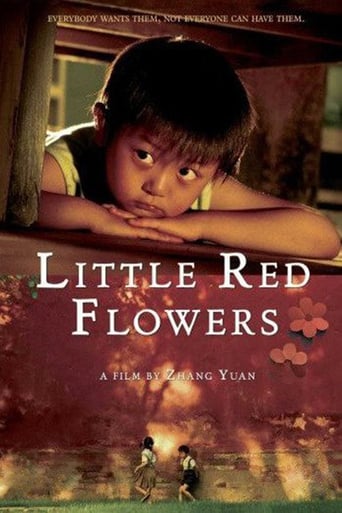SunnyHello
Nice effects though.
SnoReptilePlenty
Memorable, crazy movie
Ketrivie
It isn't all that great, actually. Really cheesy and very predicable of how certain scenes are gonna turn play out. However, I guess that's the charm of it all, because I would consider this one of my guilty pleasures.
Quiet Muffin
This movie tries so hard to be funny, yet it falls flat every time. Just another example of recycled ideas repackaged with women in an attempt to appeal to a certain audience.
Martin Bradley
If Yuan Zhang's "Little Red Flowers" isn't quite in the same class as Nicolas Philibert's masterpiece "Etre et avoir" it is still one of the best films ever made about small children in a school environment but whereas the Philibert film was a documentary this is fiction and at times the performances or 'non-performances' Zhang draws from the children are nothing short of miraculous. The setting is a boarding kindergarten in post-Revolutionary China and the central character is Fang Qiangqiang, a disruptive four year old desperate to fit in.There's no real plot to speak of and Zhang films it as if it were a documentary with perhaps more of an emphasis on the children's toiletry habits than some people might like. Although the film is perfectly innocent and full of charm, repetitive shots of our little hero and his friends in the altogether could prove problematic to Western audiences. (The Chinese, or is it just Zhang, seem obsessed with peeing, pooping and farting). Look beyond that, however, and this is a lovely account of one little boy's need for acceptance. The title refers to the little red flowers the children are rewarded for good behavior.
scarletpumpernickel
...Will explain that anon. But first let me say this film has all the earmarks of a classic.., and a knowledge of china is nice but not essential to appreciate it.As for the fog lights, this film (IMHO happily) leads you by the nose, more or less in the same modest egalitarian spirit as portrayed by the film. Filmsnobs may not appreciate this fact.Apart from amazing development and, call it directing, I was blown away by the perfect marriage between what I believe was experienced by the children as reality and the scene making/engineering which the film required - that is, between spontaneity and craft.I too on first viewing thought the end was abrupt, but I think I just wanted more. And btw, I did not recoil or even pause to ruminate over any "abuse", as I accepted the time and place and political climate. As for the issue of conformity, to those who might suggest that American schools were/are less inclined toward conformity, I would disagree. It's just that instead of conformity to a social and cultural template -(one that evidently works fairly well and produces more or less admirable people) - American students are led to conform to peers and popular culture.., often with dubious results.If you enjoyed this gem, you might like The Recipe (free IW at Netflix).
ethanoel
this is a film that you can easily watch with your little kids, because they can relate themselves to this little hero's rebellion against (totalitarian) adults and their unjust world. the protagonist in this case is a stubborn rascal but he has his own logic in behaving as he does, so take him seriously or otherwise... it is a charming little movie about children's life in post-revolutionary china, a small gem. and on general level it also is a perennial study of a child's inability to understand or accept all the strange things adults do or not do to keep their sometimes questionable authority. a nice addition to Asian kid movies which are usually more of a Japanese or a south korean field of quality cinema.
Dan
I'm disappointed by all of the previous comments on this film. This film seemed to me to be far more deeply layered and textured than previous writers have given it credit for.Having studied Chinese film (particulary the work of the 5th generation, which this film isn't part of), it's my understanding that Chinese films can't be 'read' in the same way as Western films. Due to censorship in China Chinese directors find different ways of telling stories, more often than not by dressing them up as something else. Therefore I don't believe that this film can be taken at face value. I don't believe this is a film about a small boy being sent to a kindergarten by his father and trying to earn Little Red Flowers. I think an important thing to notice is the way the boy changes. He starts off hating the regime of the school but wanting to fit in, wanting to earn a red flower, but he never does, so he deliberately alienates himself. There are many scenes where he sets himself apart from the group, and he becomes a rebel - he stirs up unrest amongst the other children. He challenges the authority. This seems to me to be deeply allegorical.I was hoping to read some comments here that would help me understand this film, because I'm finding it puzzling. I found it a very hard film to watch, and I can't say I really enjoyed it. I found it slow and repetitive with far too much emphasis on 'peeing and pooping'. However, I'm finding it a very interesting film to think about and try to decipher. I would very much like to read other readers comments on this. What, for example, is the significance of the hospital? And the children's names? There are many many questions to be answered, and many more to be asked. By my own admission I'm not very good at reading films, but I am aware of what needs to be read!

